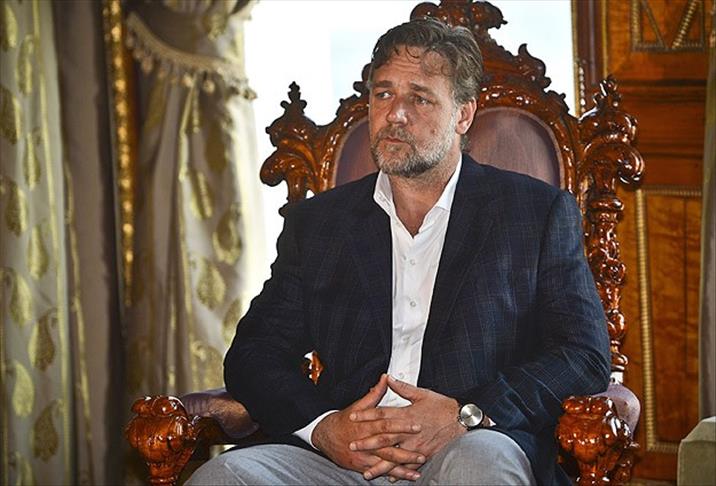Russell Crowe sees Turkish side of Gallipoli battle
Oscar-winning actor Russell Crowe says his movie, 'the Water Diviner,' leads him to understand the Turkish side of the 1915 Battle of Gallipoli.

MELBOURNE
Oscar-winning actor Russell Crowe said his movie, "The Water Diviner," led him to understand the Turkish side of the 1915 Battle of Gallipoli, in which more than 500,000 soldiers lost their lives.
Speaking to the Anadolu Agency before the movie’s premiere in Melbourne, Australia on Wednesday, Crowe said seeing a Turkish perspective on the campaign was a “very different experience.”
The actor said that Australians see the military campaign as a “set of heroic adventures that these young boys went on and ended in tragedy.” For Turks, he added, the campaign led them to empty schools because they had no soldiers left.
“I am hoping that the movie at the very least gets those kinds of conversations going in Australia. Turks have shown us a deep love. I think we need to reciprocate with respect. Our boys are still lying in Turkish soil… We should be deeply grateful for that.”
Australian and New Zealander soldiers are buried in various memorial sites in the Gallipoli peninsula.
“The movie is important as it depicts the two sides in an equal way,” said Turkish movie icon, Yilmaz Erdogan, who plays a Turkish soldier in the movie.
Crowe's movie "The Water Diviner," which was shot in Turkey in 2014, and tells the story of a New Zealand father who searches for his two sons four years after they went missing in the battle in Gallipoli in 1915.
Under the command of the British Empire, Australian and New Zealander soldiers formed an alliance called ANZAC - an acronym for Australian and New Zealand Army Corps. Their aim was to capture the Gallipoli peninsula in order to open the Dardanelles to allied navies. Their ultimate objective was to capture Istanbul, the capital of the Ottoman Empire.
After ANZAC's soldiers were exposed to Ottoman Turkish resistance, the war fell into a stalemate and the campaign lasted for eight months. The extended offensive caused tens of thousands of casualties from both the Australia and New Zealand side, which eventually led to an Ottoman victory under the leadership of Colonel Mustafa Kemal, who would later be known as Father of the Turks (Ataturk) and become the founder of modern Turkey.
Anzac Day, the 25th of April, which marks the first day of the campaign, became a national day of remembrance in Australia and New Zealand that broadly commemorates all Australians and New Zealanders who served and died in all wars, conflicts, and peacekeeping operations.
Click here to watch the interview with Russel Crowe:
Anadolu Agency website contains only a portion of the news stories offered to subscribers in the AA News Broadcasting System (HAS), and in summarized form. Please contact us for subscription options.

